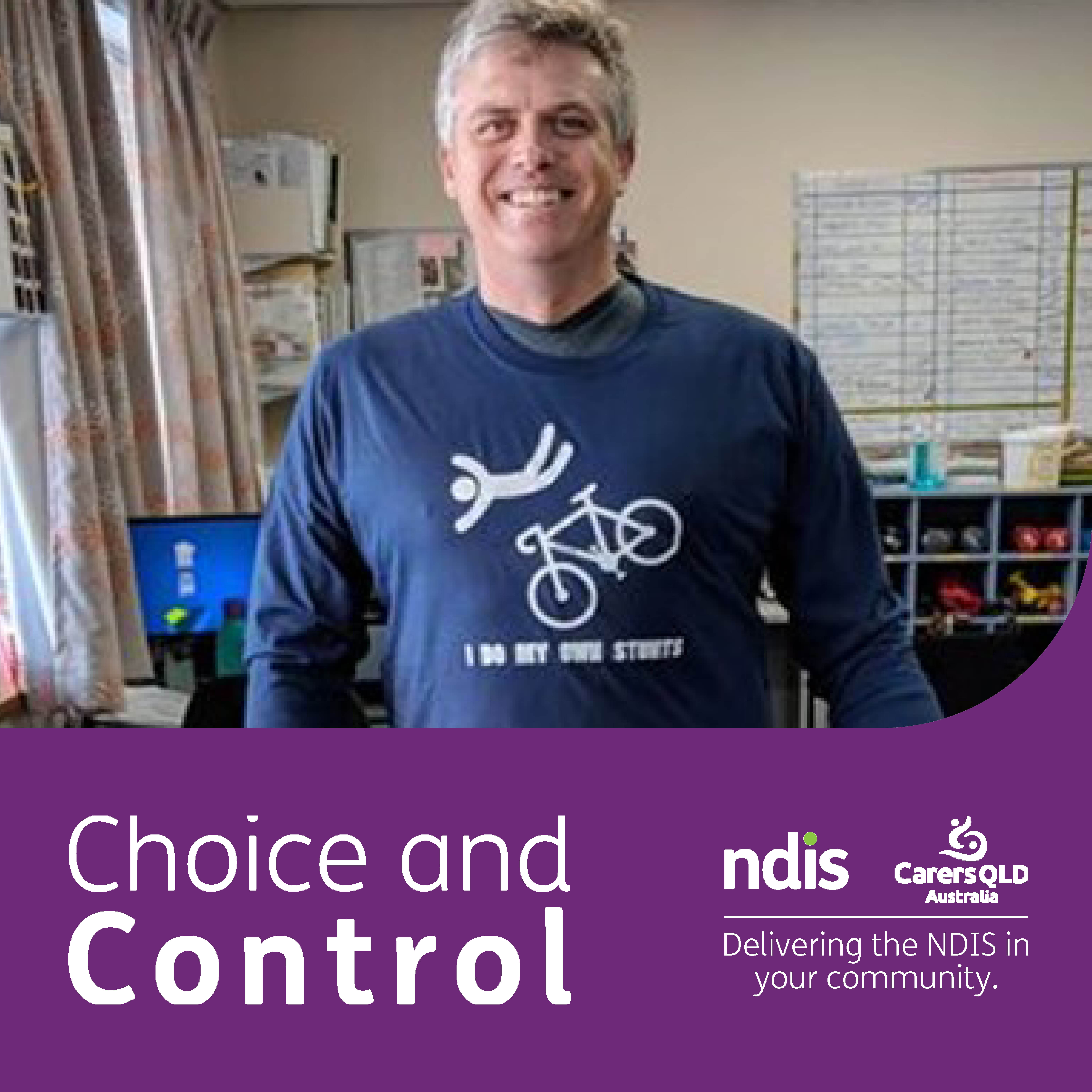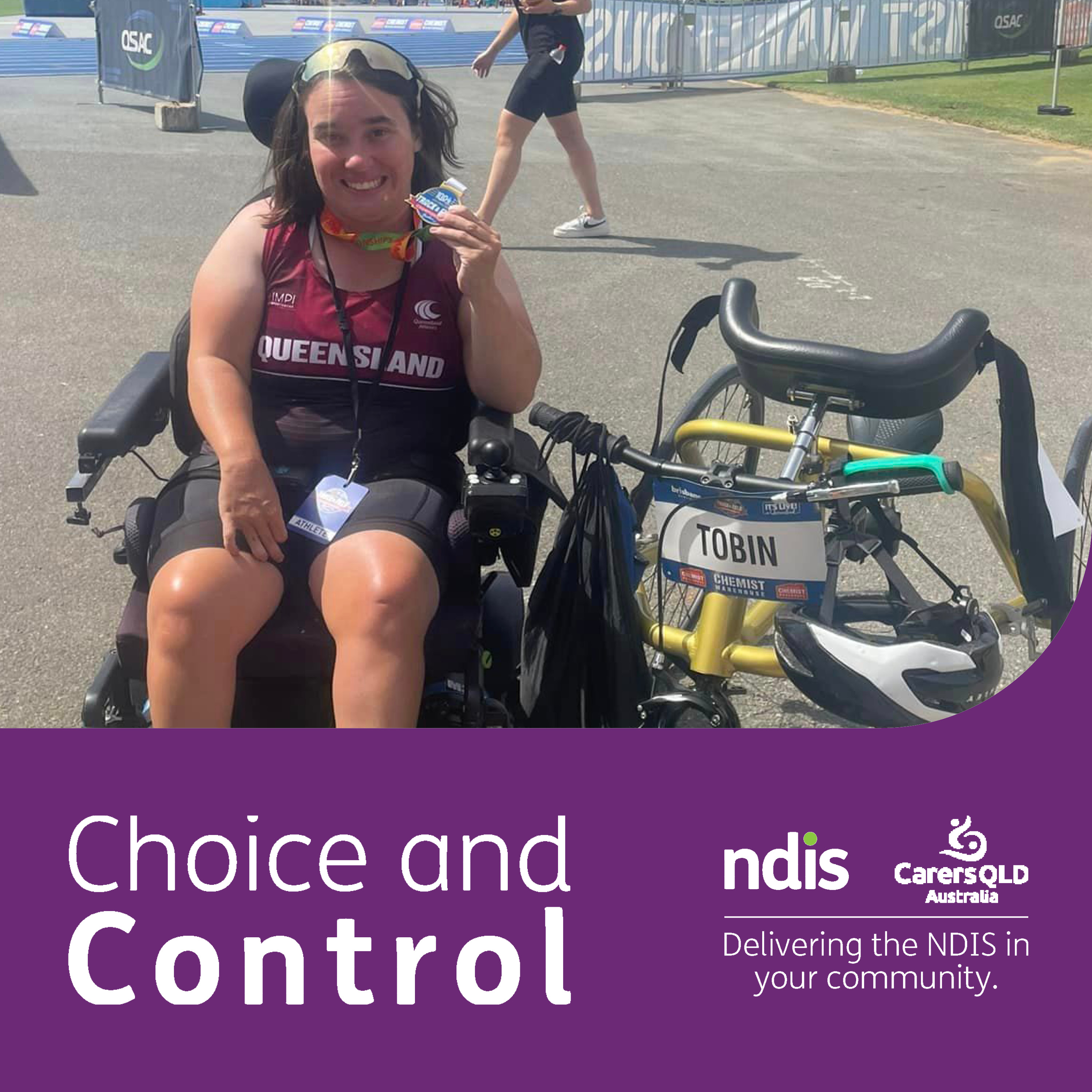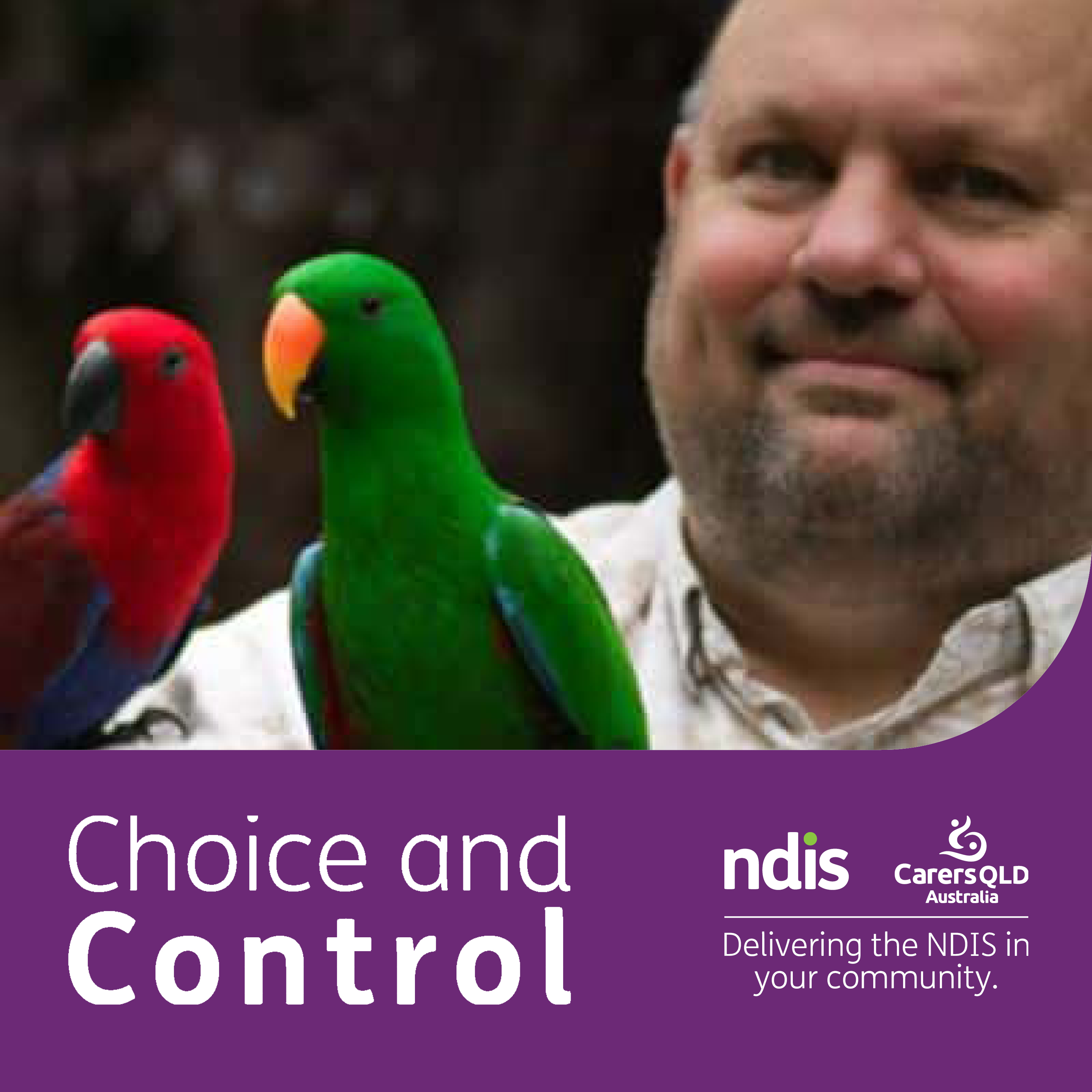Speaker 0 00:00:01 Leaving school is a huge milestone in anybody's life. And if you know, someone who needs a little extra support, carers Queensland is here to help our school to adult life transition project is making sure young people with disability have a chance to make the best start. That means building skills, knowledge opportunities, making connections with their community and meeting the people who can help them succeed. We're building a community where all our kids of all abilities are welcome and included and able to thrive. Find out more, get in touch or look for events and opportunities coming up near you. Visit our
[email protected] or call our inquiries line on one three hundred nine six three six,
Speaker 0 00:00:53 Joyce and control a podcast, celebrating people with disability brought to you by carers Queensland, N D I S local area coordination partner in the community. Gary Allen is the founder of enabled.vip. A business incubator built around the needs of aspiring entrepreneurs with disability. He knows a thing or two about business himself. His research ethics consultancy has worked around the world, including contracts in far fun places like Lithuania and Kazakhstan. Gary has multiple sclerosis and uses a power wheelchair, and he says Australia has some catching up to do when it comes to people with disabilities involvement in employment and entrepreneurship.
Speaker 2 00:01:33 When you look at the, um, stats and you compare north America, the UK and Europe, to us, the level of, um, disability, entrepreneurship compared to non-disabled folk, um, is much higher in those other countries than it is here. And when you drill down a bit that, um, it's a lack of role, which obviously becomes a self replicating problem, lack of peer support and lack of resources. So the idea of enable IP is to say, know that what we can do is if we help sort of establish, nurture, and support each community of practice and try and help folk, you know, whether it's monetizing a ABI or craft, establish streaming a micro business, or establishing a small business, if we can help people to do that. And you know, we're not talking about the next apple or Amazon, you know, we might only be talking about a few hundred dollars a month, you know, they could transform people's lives. So over 40% of Australians who live with a disability are living on or near the poverty line. So if we can do something to help, I think that's just a massive public. Good. So that's what we're trying to set up.
Speaker 3 00:02:48 How long has enabled.vip been in existence?
Speaker 2 00:02:51 So we've been working on it for about two years. We're currently doing a pilot test for 10 Australians. We've got the resource library on the blog live now.
Speaker 3 00:03:02 So how is enabled VIP different to what else is out there or is there nothing else out there like this
Speaker 2 00:03:09 Look, I mean, there's remarkable, which is a group down south, which is a technology incubator for over disability. Um, the stuff they do is great, but, um, they're a bit later journey than we are. So we've already chatted to them about, Hey, we might have some members that we urge in their direction. Maybe they have some people contacting them that they, um, urge in our direction because, um, university of technology Sydney did a research group that was looking at disability entrepreneurship about 18 months ago. And when you heard people talking about the program, a lot of folk with disabilities kept talking about how much, how difficult it was to jump from doing nothing at all in the business space to running your own business and how much, um, apprehension caused. And so what we thought was, you know, I think that there's a good support for the idea of what their reason is that the support to help people do it, um, and want them through basis to things like setting up your, an ABN and thinking about insurer, setting up, um, tracking for your money, that sort of thing. So the point of the, of VIP is to say, you know, we can help. So we are a source of support. Unlike the incubators that are out there for nondisabled folk, you know, we get disability, we understand there will be times where people just won't be up to brushing around setting things up. And so it's a gentle of eight of us be a friend that helps you support a, a voice that you can call on for advice is really what we're trying to set up.
Speaker 3 00:04:55 And why do you think it's important for people with disability to have employment goals?
Speaker 2 00:05:01 I think it's incredibly important. Um, really what we end up talking about is dignity, social connection, essentially, you are making a contribution and your work is actually being recognized. If we help people to actually set it up, something that would generate money, it connects them to society. It gives them some affirmation and dignity. So I think is a net benefit. So, um, in the UK, there was a program helping folks with intellectual discipline to set up their own business and that they worked out saved just over 2 million pounds in terms of, um, reduced payments because people Don earning some money, reduce call on mental health and social support services because of that way of connection. So gr university has got, um, something they called the dignity project, which we connect to fairly strongly because, you know, we believe that when we're talking about entrepreneurship and we're talking about that kind of engagement, that is absolutely about dignity,
Speaker 0 00:06:12 Starting a business, like everything else takes money. And that can be a huge barrier if you're currently underemployed or unemployed. So enabled.vip has a free option to make sure it's accessible for the people who need it most.
Speaker 2 00:06:27 So at the moment, we've got what we call prongs membership, which is completely free. Anybody that lives with a disability, a carer or someone bit established connection to disability in Australia can join the platform for free. When they join that way, they get access to our resource library. They will get invoices to our, um, webinars to be sent up, sent up upload. You know, it is probably about 80% or so of the platform they're able to access for no cost. And, you know, there's no expectation that they do anything there, read the stuff that's interest I'll interest in them and participate in any event that catches their interest. So, I mean, I just really would encourage people to, um, join as a prime member. So if you go to the enabled V P website, um, there's a drawing link and as public drawing, there's a spot where you can say, you want to join as a free member. I'm not doing this to, um, doing this to make money. But I mean, I think that, um, what Australia's doing at the moment isn't working the country cannot afford or to be doing a better job about disability employment. I think disability entrepreneurship is a big, big part of that equation.
Speaker 0 00:07:49 Do you have a passion or a talent to share with the world? A small business can be a great way for people with disability to earn income, build your confidence, be more independent and be an active part of your community. Carers Queensland is supporting our next generation of entrepreneurs with the, be your own boss micro-business project. It's a place to find out what it means to start a business, whether it's a good fit for you, connect with business mentors and learn from existing micro-business owners and even opportunities to showcase your goods and services in the, be your own boss marketplace. Find out more, get in touch or look for events and opportunities coming up near you. Visit our
[email protected] or call our inquiries line on one, three hundred nine, six three six.
Speaker 3 00:08:38 So you've spoken about enable VOP a bit. Tell me about other, what other things are you invested in with work?
Speaker 2 00:08:45 My day job is, um, <inaudible> university. I'm in the research office as a full-time staff member. I've been there since 2003. I, the for profit company I mentioned before is a consultancy firm in the research ethics and research integrity space. And that's something I'm passionate about. It's really been really exciting the way it's been growly. It's just, as I say, the opportunity to actually pay forward in terms of some of that experience I've had, I mean, I think it's not that hard to set something up that will generate you some income, and if we can help you make those steps, you know, it's not an insurmountable goal at all.
Speaker 3 00:09:30 Did you have to change your career trajectory after you were diagnosed with multiple sclerosis?
Speaker 2 00:09:37 I was on a particular career path at the time. I was first got ill with multiple sclerosis, which forced a career change. And it's the best thing that happened to me. If you look at your life, you can't look at the bad things that happened to you and say, I wish that hadn't happened. If it hadn't happened. I would've done these other things because you won, be the same person. If you didn't have those bad experiences in your life. So I'm pleased that I've got Ms. I pleased that did force change in terms of how I look of my life, how I put my family and where I put my energy. So this, uh, tendency to focus on the nasty symptoms. But, um, actually also has been some really important doors, which is opened.
Speaker 3 00:10:25 Yeah, that's a great force for you to have definitely. And where do you see yourself in five or 10 years time with your employment and, and your projects
Speaker 2 00:10:33 I'm planning, but I'll probably retire from the regular, um, workforce. And about two years, I hope after that to keep doing work on pars and the no IP, I'd love to be in a position where a no board is earning me a little bit of money, but, um, but you know, it's I say it's not about making properties. It's about affecting a constructive change. So, you know, that's your question. I, in five years time, I'm, you know, happily retired from regular work and I'm doing the things that I love in terms of those other, other two projects.
Speaker 0 00:11:13 Former us president George W. Bush coined the phrase of the soft bigotry of low expectations. It refers to people who are vulnerable or marginalized, including many people with disability, not being expected to Excel and achieve at the same rate as their mainstream counterparts. And Gary sees something of that attitude in the accepted wisdom around disability employment.
Speaker 2 00:11:37 He's not very enabling. So he is not about helping people to achieve, you know, what their dreams are. It's, you know, what are you prepared to settle along? And so, I mean, I think it's an important change of the conversation to say, and then help people pursue that. I think a folk in the workforce over 30% of them have experienced some sort of P prejudice or discrimination. And so, you know, disability, entrepreneurship is way it's great. It allows people to set up their own work, set up and their space and what they're pursuing rather than being knocked into a toxic working environment.
Speaker 3 00:12:17 Just tell me a little bit about your N D I S journey. When did you access the scheme and what sort of supports are you accessing now?
Speaker 2 00:12:25 So I started when, um, Brisbane first went life. So what's that now two or three years ago, it's made a phenomenal difference to my life. I get, um, a couple of Hep carers that help me out during the day. And, you know, as my ability with keyboard mouse has started to deteriorate, having somebody that can help with that means I keep on doing the things I love, but it's also being able to do some social activities and connections. All of that has really been made possible on the N D I S you know, I think the advice that I want give to both years engage with a, a plan manager and a service coordinator, engage with their local area coordinator to get advice so that they're actually able to use their plan to the max it's worth the effort to actually set up a name.
Speaker 2 00:13:29 One of the, um, things that floored me, the update, um, was about 50% of, um, Australians with disability of women. Only about 30% of NDI clients are women, which just completely flawed me. So it's something that we are trying to do something about therapy. So, um, of our, of our board members, four outta six members of the advisory board of women, and we are very conscious of act of, um, intersectionality in terms. So for example, if you're a woman with a who lives with a disability and you're indigenous, you are gonna be facing three levels of, of barriers. So it's something that we very conscious of, you know, provide P and looking at ways to address that. So there us, on the advisory board business people would I with disability thing. So we thought it it's really important to have the model of nothing for about us without us. Um, so, you know, we think that's really important to authentic perspective of how we get some of these realities.
Speaker 3 00:14:45 And you definitely keep busy with this projects, the, for profits, the working, and you saying, you know, the N D S is allowing you to have a bit of a social life as well. What do you do in your, your limited spare time?
Speaker 2 00:14:59 Uh, my wife's son and I discovered a genuinely wheelchair friendly, um, apartment, um, up at little of, so went up there for two weeks together, and it was a spot that had a hospital bed eat and a hoist in the apartment, which just made it possible basically for me to be there during the holiday and enjoy time with them, whether or not I do enough of that is probably, um, an open question. Given the fact I'm the self confessed work. I probably not enough. I try and I member of a couple of social groups of online groups. So like the disability leadership Institute Institute is, um, just a fantastic way of connect with folk nationally and, um, unplugging from the grind for a little while
Speaker 0 00:15:56 To find out more about enabled.vip. You can look them up online. The address is exactly what you think it will be enabled.vip and for more support and resources around starting your own business, you might be interested in carers Queensland, be your own boss microbusiness project. Find out more about that on the carers Queensland website, carers qld.com.au. Thanks for joining us at choice and control a carers Queensland podcast. For more information about the national disability insurance scheme or carers Queensland, contact us
[email protected]. You can call us on one, 300 triple 9, 6, 3, 6, or head to Facebook and look for carers Queensland. And the is.


